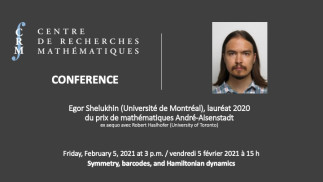Résumé:
In the early 60s Arnol'd has conjectured that Hamiltonian diffeomorphisms, the motions of classical mechanics, often possess more fixed points than required by classical topological considerations. In the late 80s and early 90s Floer has developed a powerful theory to approach this conjecture, considering fixed points as critical points of a certain functional. Recently, in joint work with L. Polterovich, we observed that Floer theory filtered by the values of this functional fits into the framework of persistence modules and their barcodes, originating in data sciences. I will review these developments and their applications, which arise from a natural time-symmetry of Hamiltonians. This includes new constraints on one-parameter subgroups of Hamiltonian diffeomorphisms, as well as my recent solution of the Hofer-Zehnder periodic points conjecture. The latter combines barcodes with equivariant cohomological operations in Floer theory recently introduced by Seidel to form a new method with further consequences.
Biographie:
Egor Shelukhin est un mathématicien qui travaille actuellement comme professeur adjoint au Département de mathématiques et de statistique de l'Université de Montréal. Il a obtenu son doctorat en 2012 à l'Université de Tel Aviv sous la direction de Leonid Polterovich . Shelukhin a ensuite été chercheur postdoctoral CRM-ISM au Centre de recherches mathématiques (CRM) de 2012 à 2014. Il a passé le semestre de printemps 2014 à l'Université hébraîque de Jérusalem et l'été 2015 à l'Université Lyon 1 Claude Bernard . Shelukhin a été boursier à l'Institut Mittag Leffler en septembre 2015. De 2015 à 2017, il a été membre de l'école de mathématiques de l'Institute for Advances Study , Princeton. Son travail est centré sur la topologie symplectique, la topologie des contact et l'analyse géométrique.

